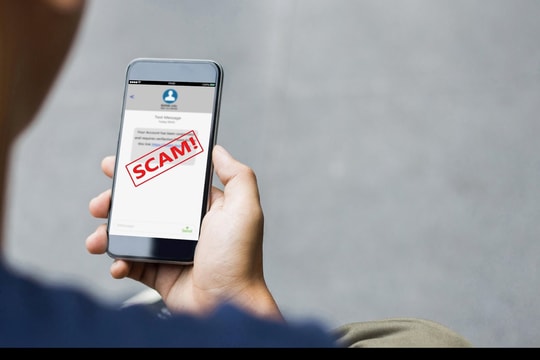Fake news - many tricks, many tricks
(Baonghean.vn) - According to the Ministry of Information and Communications, the spread of fake news and false information has shown signs of increasing, focusing mainly on inciting regions, dividing the great national unity bloc; spreading false information...
From the beginning of 2021 to March 28, 2022, the Vietnam Fake News Handling Center received 4,107 reports of false information, of which 1,436 were verifiable (clear information with full content, violating links, etc.), 502 were bad and toxic news (defaming Party and State leaders, leaders, domestic politics, reactionary news, etc.),... The Fake News Center of the Department of Radio, Television and Electronic Information has verified the information and published 49 fake news.
As of March 28, 2022, the Vietnam Fake News Handling Center has received 269 reports of false information, which are being verified by the Center.
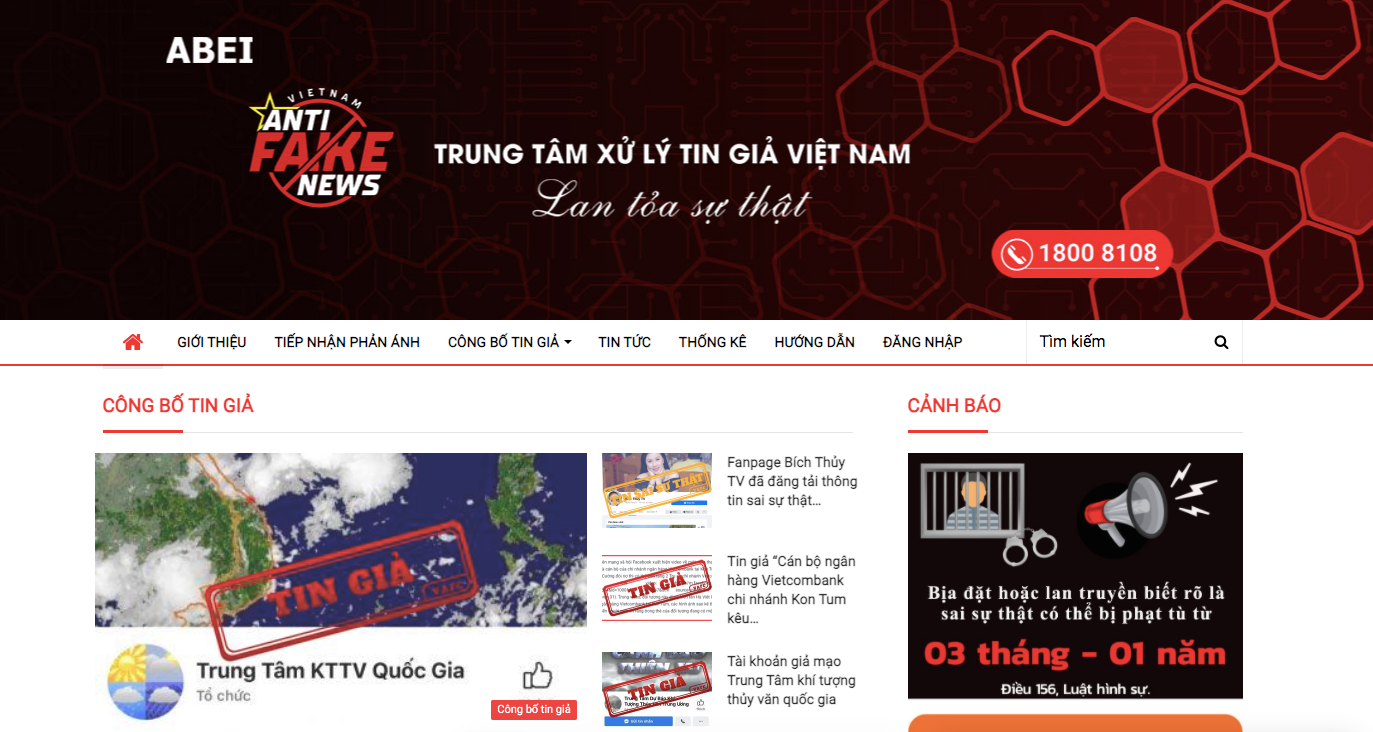 |
| Website tingia.gov.vn. Screenshot |
Create fake websites, Facebook, messages to scam and slander
Recently, many people have reported receiving text messages with the content "Wanted warrant". The content of this message clearly states the time of the decision and the wanted behavior, and at the same time requires the recipient to voluntarily present themselves. When receiving text messages with similar content as above, many people are confused because they are not equipped with the necessary legal knowledge, thereby creating loopholes for fraudsters to operate.
Recent,CentralThe Vietnam Fake News Center (VAFC), under the Department of Radio, Television and Electronic Information, has just announced another fake website. The website “baogiaothong.net” has a domain name that can be confused with a press agency, impersonating Giao thong Newspaper, providing general information on the internet without a license. Notably, on this page there is a link to a website to look up driver's license with the addresses "gplxgov.org.vn" and "tracuugplx.vn", impersonating the driver's license information lookup page of the Vietnam Road Administration. According to the leader of the Vietnam Road Administration, there is currently only one website to look up driver's license information with the address https://www.gplx.gov.vn. This can easily confuse users if they do not pay attention to the domain name.
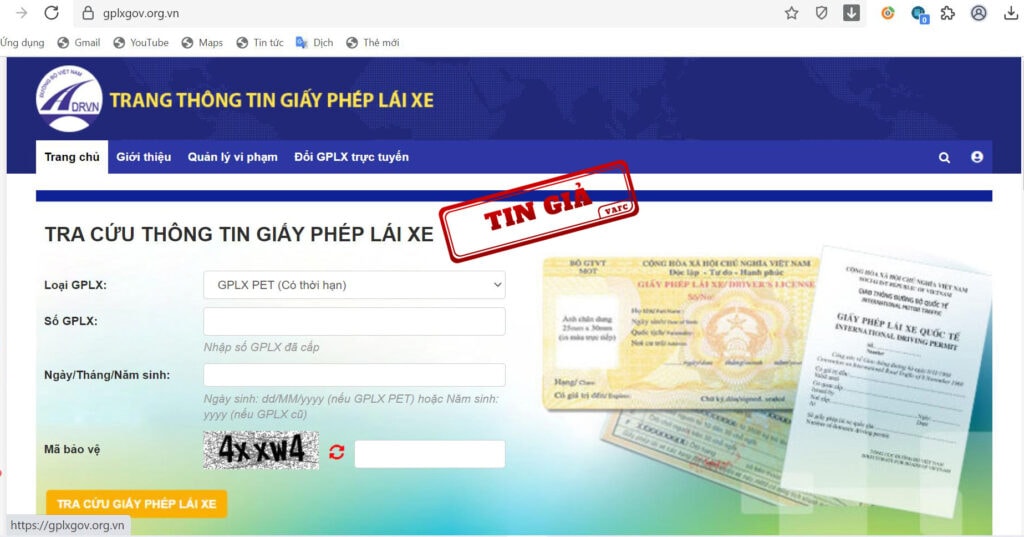 |
| Website impersonating the driving license information lookup page of the Vietnam Road Administration. Source: VAFC |
The situation of property fraud crimes is still complicated with many different methods and tricks, especially crimes using high technology to commit crimes... causing public outrage, affecting security, order and people's lives. In particular, the trick of impersonating people with positions and powers to commit fraud, especially impersonating police officers, prosecutors, courts... continues to occur even though the authorities have repeatedly propagated and announced the methods and tricks of this type of crime on the mass media.
Some of the methods and tricks that these subjects often use are: Services that have the function of faking prefix numbers, faking phone numbers, impersonating officials of law enforcement agencies such as police, prosecutors, and courts to call people to put pressure, make people panic, then request money transfers to accounts provided by these subjects to appropriate.
The subjects use many different scenarios such as: Pretending to be a post office employee calling to notify of receiving a parcel; a telecommunications employee calling to notify of a debt; an electricity employee calling to notify of a debt, threatening to cut off the electricity; a traffic police officer calling to notify of a fine, causing an accident and fleeing... They contact the victim to exploit personal information, then use that information to fake arrest warrants and prosecutions from the police to threaten the victim (often informing the victim that the victim is involved in transnational drug trafficking and money laundering), asking the victim to transfer money to an account provided by them to serve the investigation, then appropriating or asking the victim to register a bank account, transfer money to that account, then provide the account, password, OTP code to the subjects, then they withdraw money from the account to appropriate.
In addition, the subjects also impersonate acquaintances of Party and State leaders, leaders of agencies in charge of key areas to commit fraud. The common characteristic of these subjects is that they often impersonate acquaintances of high-ranking leaders, leaders of agencies in charge of key areas, providing photos and videos of themselves with leaders (many products have been cut and edited with high technology) to create trust. Then, they promise to be able to run cases, get jobs, apply for projects... and receive money from the victims but do not do so, give many reasons not to return the money, and even flee.
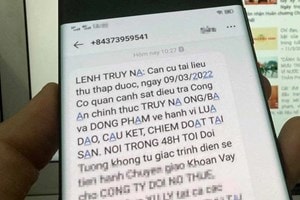 |
| Many people received fake text messages with wanted notices. Source: VAFC |
The subjects can impersonate banks by offering and providing online loans from banks. The subjects often approach victims by calling, sending messages, emails, and via free messaging applications. Then, they instruct the victims to apply for a loan or open a credit card through a fake bank website; send fake documents "confirming loan approval" to the victims to create trust and ask the victims to pay fees or initial installments into the designated account, then appropriate the money.
Facebook social network prize-winning scams are recurring more and more. With the tricktext message to win prizes via Facebook, users receive a notification of winning prizes via Facebook messenger message with the content: "Congratulations to messenger account... for being lucky enough to receive the first prize/special prize from the Customer Appreciation Week event,... The prize is 01 SHi motorbike, 100-200 million VND in cash and many other valuable gifts...". In order to create trust for the recipient, the message also announces that this is an accurate message confirmed by the system and asks the recipient not to provide the winning code to anyone. To receive the prize as announced, the recipient needs to complete the application according to the instructions, including full information of the recipient to complete the procedure for receiving the prize. Many people are quite cautious, so they also try to contact the phone number provided in the message, but after listening to the call, they completely trust it and follow the instructions, completing the procedure to transfer money to the stranger. However, after transferring money, it will be impossible to contact this phone number anymore and the account that announced the winning prize will also block the Facebook of the person who transferred the money.
Or the scenario could be that the subject will impersonate an agency or organization to announce a “lucky prize”. Specifically, the subjects impersonate employees of shopping malls, television stations, lottery companies, etc. to call or text the victim to inform them that they are lucky to receive a high-value prize from a certain program. To receive this prize, the victim must buy a product from the subject that is worth more than the market price or transfer a tax amount to the subject in advance to receive the prize, then appropriate it.
Most of the above scams prey on the gullibility of some people when they hear about awards given by big companies such as Samsung World, Mobile World, Electronics Supermarket, Vinamilk Milk or awards licensed or labeled by authorities such as the Ministry of Industry and Trade, Ho Chi Minh City Television, etc.
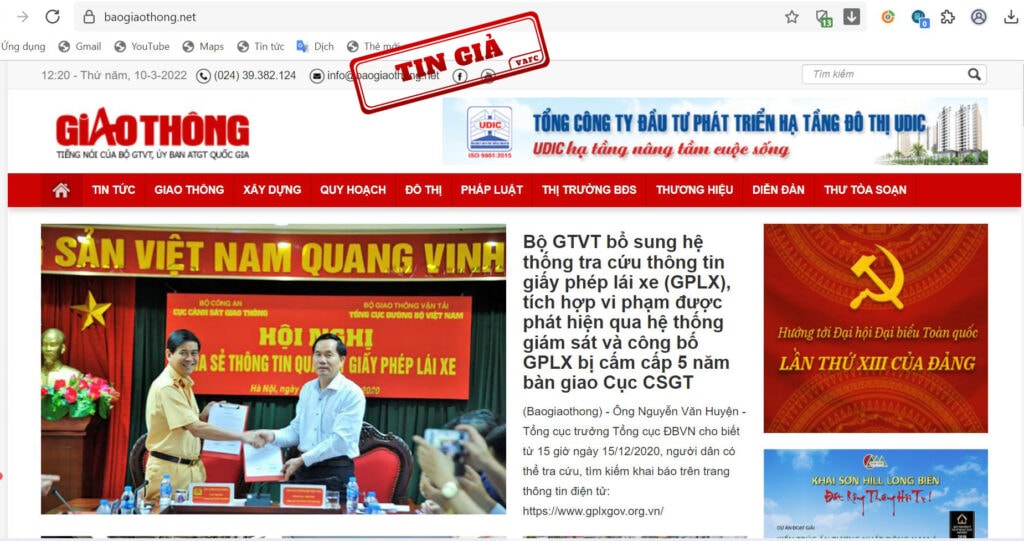 |
| Fake website of Giao thong newspaper. Source: VAFC |
Beware of fake news and scams
According to the Ministry of Information and Communications, through the practice of directing, managing and monitoring information on the Internet in recent times, the situation of spreading fake news and untrue news has shown signs of increasing, focusing mainly on inciting regions, dividing the great national unity bloc; spreading false information...
From the beginning of 2021 to March 28, 2022, the Vietnam Fake News Handling Center received 4,107 reports of false information. The Fake News Center of the Department of Radio, Television and Electronic Information verified the information and published 49 fake news, including fake news related to natural disasters and epidemics: 13 news; fake news about Security, order and safety - society: 06 news; Scam links: 07 news; Fake accounts: 14 news; Health and medical: 05 news; Other types: 04 news (publishing official accounts, ...)
As of March 28, 2022, the Vietnam Fake News Handling Center has received 269 reports of false information, which are being verified by the Center.
In Nghe An province, in the first quarter of 2022, Nghe An Provincial Police handled 21 cases, the Department of Information and Communications handled 5 cases of violations of spreading false information, most of which were false information about the Covid-19 epidemic in the province, administratively fined tens of millions of VND, and at the same time required to remove the article and seriously learn from experience.
To identify fake news, the Department of Cyber Security and High-Tech Crime Prevention (Ministry of Public Security) pointed out the following characteristics: fake news often does not pay attention to the format of the text, or has spelling and grammar errors. In particular, the images used are mostly photos from the internet, edited and cut; people need to check the source of the image through the "search Google for image" feature to find the original image. In addition, fake news is often created based on a real event or situation, and the writer adds some fake details, falsifying important content.
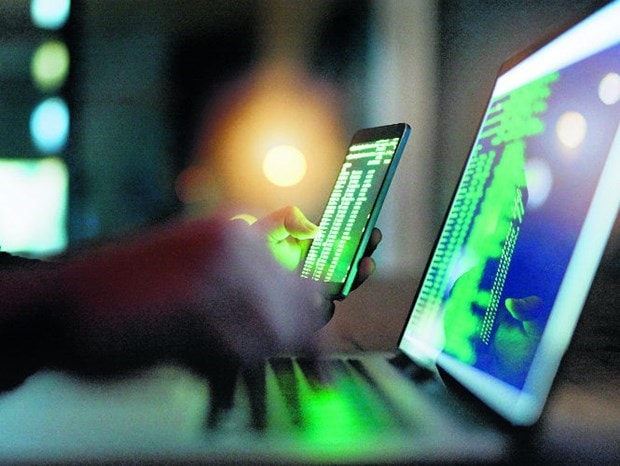 |
| Be wary of fake news and scams. Illustration: Document |
The representative of the Department of Industry and Trade said that regardless of whether they win a prize in a program, people must register to participate in the prize drawing/lottery program. There is no case where businesses choose customers, draw prizes, and award prizes without prior notice to people. In particular, there are very few cases where large businesses announce their winners via Facebook messages.
To avoid falling into the trap of scammers, people should absolutely not provide personal information to strangers. People need to be vigilant when receiving calls from landline numbers, the caller claiming to be an officer of a state agency, especially the police force, to notify and request investigation of the case over the phone; do not provide personal information, phone number, home address... to any subject when the identity and background of that person is unknown, especially do not listen to the subjects transferring money to designated accounts. The functional forces, especially the police force, the prosecutor's office, the court, if working with people, will have an invitation, a summons sent to that person and work directly at the agency's headquarters, not work online. If necessary, ask that subject to provide full information about full name, position, work unit, address, phone number (for individuals); Company name, specific address, phone number, tax code, business registration certificate (for businesses). Then, it is necessary to find out and verify the information of that entity through other sources of information.
At the same time, regularly check and update security and privacy features on bank accounts and social network accounts; do not lend or rent related personal documents, do not accept bank transfers or receive money transfers from banks for strangers.
According to Decree 15/ND-CP of 2020 regulating administrative sanctions in the fields of post, telecommunications, radio frequencies, information technology and electronic transactions, there are 3 articles (Clause 3, Article 100; Clause 1, Article 101 and Clause 3, Article 102) related to administrative sanctions related to information.fake,with fines ranging from 10-70 million VND.

